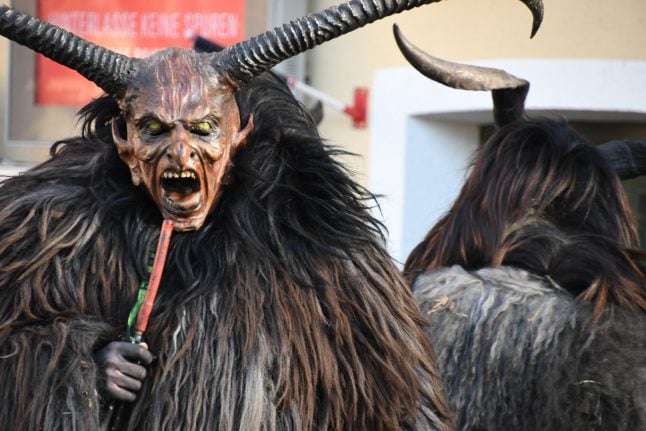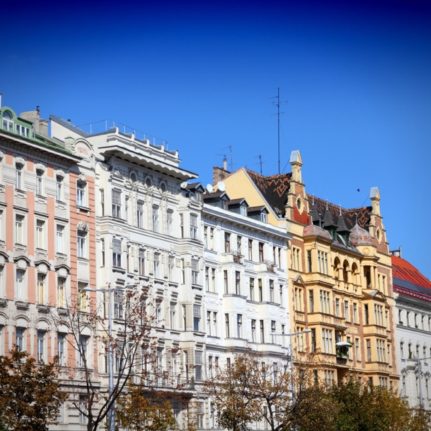In Austria, December is closely associated with the numerous Christmas markets; nevertheless, there are also many other interesting events to check out.
Experience the Krampus Parade
The Krampus parade is a traditional Austrian procession with its origins in folk tales about Krampus, an anthropomorphic creature who punishes children if they have not behaved well with gifts of coal – and the occasional spanking.
Krampus appears looking like a cross between a goat and a demon, with shaggv black or brown hair, goat horns, a forked tongue, vicious sharp fangs, and cloven hooves. During the parade, participants dress up as the creature and roam the streets of the town while the audience gathers to watch them.
Many cities in Austria organise a yearly Krampus parade which normally take place on either St. Nicholas Eve (December 5th) or St. Nicholas Day (December 6th). Specific dates and locations are typically announced on each region’s homepage, or the tourist website of the region. A few of the more famous Krampus celebrations occur in early December in Salzburg, Innsbruck, and the town of Ischgl.
December not only hosts Christmas markets all over the country but also specific design markets, mainly in the bigger cities. On December 9th, WAMP Design Market welcomes visitors to its special Christmas edition. WAMP stands for “Where Art Meets People” and It is an open-air market featuring local and international artists and designers. The design market adds its name to a list of events that bring its visitors in close contact with the creative community.
Kunst and Design Markt Innsbruck
Another design market worth visiting during December is Kunst and Design Markt Innsbruck. More than 100 exhibitors and artists within fashion, jewellery, clothing, wood design, ceramics, furniture, stationery, decoration, art, and graphic design are participating. The event takes place on December 2nd to 3rd in Innsbruck.
Visit a colourful acrobatic dance show
‘Africa! Africa!’ is a colourful circus and dance show touring through Austria during the winter months. The show is performed in Graz from December 12th to the 14th. It presents the traditional heritage from Ethiopia to the Ivory Coast, from Morocco to South Africa, as well as the development of Afro-American and Afro-European culture in a global setting. The show was developed by and features over fifty dancers, acrobats, musicians and artists, from ten different countries.
Enjoy traditional folk music in Salzburg
The Salzburg Advent Singing is a traditional musical and cultural event held annually in Salzburg around Christmas. This year it takes place from December 1st to 17th. The event running for the last 75 years, is known for its enchanting performances of folk music, small vocal ensembles, and Alpine melodies, carrying messages of happiness and peace.
The event is hosted at the Grosses Festspielhaus, a prominent venue in Salzburg’s city centre. It is characterised by an intimate and festive atmosphere, drawing around 36,000 visitors from 38 different countries each year. Central to the event are presentations of gentle, reflective, and joyful folk melodies, performed by musicians and vocalists. The inclusion of Alpine folk traditions and costuming communicate the spirit of Christmas.
The event has become a cherished tradition, bringing together locals and visitors to celebrate the holiday season with the rich cultural heritage of Salzburg its Alpine regions.
Vienna International Film Awards
The Vienna International Film Awards (VIFA) take place from December 2nd to 10th. VIFA admits short films in various genres and categories from across the globe. For 9 days, visitors can enjoy public screenings of award-winning independent films.
The festival is run by a small group of volunteers, film enthusiasts, and professional film judges. The objective of VIFA is to provide support to independent filmmakers, promote their talent, and give them a chance to present their work to industry professionals with substantial experience in their field. The judges consist of international filmmakers and industry professionals.
The Human Rights Film festival
During the same time frame, The Human Rights Film Festival also takes place in Vienna (November 30th- December 10th). This film festival features documentaries, narrative films, and short movies that address various aspects of human rights. The purpose is to raise awareness, motivate discussion, and inspire action on human rights challenges globally.
Tango Weekend in Graz
During the weekend of December 1st to 3rd, professional tango dancer Eleonora Kalganova, accompanied by Sebastian Arce, is offering a two-day tango course in Graz. Eleonora Kalganova is a dance artist and teacher who focuses on exploring improvisation, flow, and communication as a process and performance in Argentinian tango.
Want to celebnrate the New Year in Vienna? Follow a party trail which winds from Freyung through Am Hof square, Graben, Stephansplatz, and Kärntner Strasse to Neuer Markt, with Graben hosting dance schools offering waltz courses in the afternoon and an open-air ballroom in the evening. The activities take place from 2 pm to 2 am and restaurants and bars along the trail serve punch, sparkling wine, and snacks. Six locations across the city offer free entrance to the festivities, involving entertainment such as show programs, waltzes, rock, pop, disco, blues, funk, soul, and DJ lines.
Classical concerts on Fridays in Vienna
On every Friday at 7 pm, the famous Wiener Symphoniker holds short classical concerts in the Great Hall of the Wiener Konzerthaus in Vienna. These concerts are typically around 1 hour long, and each occasion features a specific program.



 Please whitelist us to continue reading.
Please whitelist us to continue reading.
Member comments